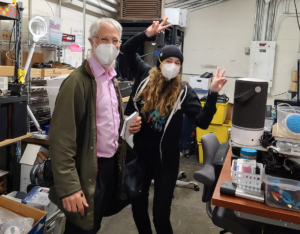 Adelle Pomeroy from Free Geek met Barry and Maryanna at Free Geek’s facility in Portland, Oregon in February, 2022. The facility was preparing to reopen to volunteers on the following day, after being closed for an extended period due to COVID-19 restrictions. Since Free Geek has a culture of inclusive decision-making as documented in their origin story, each department was responsible for a turn following the strict sanitation regime required during COVID.
Adelle Pomeroy from Free Geek met Barry and Maryanna at Free Geek’s facility in Portland, Oregon in February, 2022. The facility was preparing to reopen to volunteers on the following day, after being closed for an extended period due to COVID-19 restrictions. Since Free Geek has a culture of inclusive decision-making as documented in their origin story, each department was responsible for a turn following the strict sanitation regime required during COVID.
Free Geek’s mission is to sustainably reuse technology, enable digital access, and provide education to create a community that empowers people to realize their potential. They aim to include everyone in the digital future. The computers granted to Digital Inclusion participants are saved from landfills. They help provide digital literacy skills to the community’s most vulnerable populations. Thus, Free Geek matches excess electronic waste in need of sustainable reuse and recycling with the lack of access to basic technology among vulnerable populations.
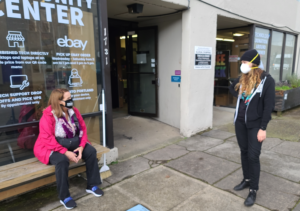 The visit started by talking outside, then we moved inside for a tour once the rain started. Adelle runs the digital inclusion and technical support programs. She shared with us their new signage. They have been in this facility since 2000, expanding over time to
The visit started by talking outside, then we moved inside for a tour once the rain started. Adelle runs the digital inclusion and technical support programs. She shared with us their new signage. They have been in this facility since 2000, expanding over time to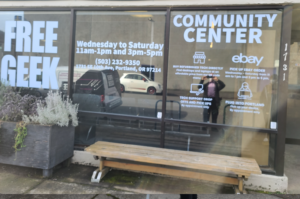 take over the entire building. They are running out of space to accept more equipment and grow. They accept almost all electric items through their community events, with the exception of personal care products and major appliances.
take over the entire building. They are running out of space to accept more equipment and grow. They accept almost all electric items through their community events, with the exception of personal care products and major appliances.
They accept drop-offs, will pick up items for a fee, and work with Ridwell, which has curbside pickup of non-recyclables in Portland. Free Geek gets the electronics. Upon entry, equipment is cataloged, and data is sent to the Secure Data Area- a restricted area accessible only to four trained staff. Devices are cleaned to NAID standards or destroyed. Eighty percent of consumer donations are recycled, leaving twenty percent to be refurbished. Free Geek also accepts corporate donations, which have a much higher refurbishment rate. They give away 1400-1800 computers per year. They work with SNAP and other food benefit organizations, which purchase computers for low cost and give them to their clients. This has been a better model for Free Geek, providing income to pay their staff.
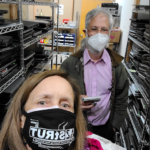 The computers they provide run Linux Mint 21, and include 6-12 months of technical support (with TeamViewer, if the customer installs it). They typically receive 10-20 support calls per day, opening approximately 100 tech support tickets per month. Seventy percent of these technical support requests are digital literacy related (such as using a phone, accessing email, resetting a password, choosing a password, troubleshooting wifi issues), with the other thirty percent being hardware-related. For hardware repairs and upgrades, they have a sliding scale based on ability to pay.
The computers they provide run Linux Mint 21, and include 6-12 months of technical support (with TeamViewer, if the customer installs it). They typically receive 10-20 support calls per day, opening approximately 100 tech support tickets per month. Seventy percent of these technical support requests are digital literacy related (such as using a phone, accessing email, resetting a password, choosing a password, troubleshooting wifi issues), with the other thirty percent being hardware-related. For hardware repairs and upgrades, they have a sliding scale based on ability to pay.
To assist with support and skill development, Free Geek has been developing virtual assistance videos. They are working on translating these into Spanish. The video content has been developed in response to frequently asked questions for tech support. The intent is to continue to grow the catalog of on-line classes over time. Their training videos are available on their Youtube page (they do not have a YouTube channel, but they do have a few playlists, including a Linux Mint 20 Tutorials playlist.)
Prior to COVID-19, they had extensive on-site classes, utilizing 32 volunteers (primarily tech industry retirees). With COVID restrictions and health concerns, they suspended the classes, but as they resume, they will be at partner sites. Training at partner sites has the advantage of being near the community served, so Free Geek doesn’t need to provide transit vouchers. Some of these partners are hardware grant recipients, where Free Geek provided the equipment for a lab. In other locales, Free Geek brings the equipment, teaches the class, and students go home with their new computer.
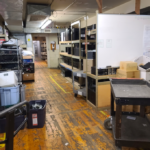 After a history of providing computers to volunteers, or community members, if they fulfilled a service requirement, Free Geek has transitioned to an income-based approach, recognizing that those without computers and without much money also have severe time restrictions, so couldn’t afford 24 hours of volunteer work. After looking at the data of who was being served, they realized the volunteering wasn’t equitable. They now give computers to people who are less than 200% of the Federal Poverty Level.
After a history of providing computers to volunteers, or community members, if they fulfilled a service requirement, Free Geek has transitioned to an income-based approach, recognizing that those without computers and without much money also have severe time restrictions, so couldn’t afford 24 hours of volunteer work. After looking at the data of who was being served, they realized the volunteering wasn’t equitable. They now give computers to people who are less than 200% of the Federal Poverty Level.
In our Community center we employ Digital Navigators who engage community members and help them build foundational digital skills in English and Spanish. We also help community members navigate our programs and apply in person and by phone. We sell devices in person at the community center to folks who can’t access our ebay store or who don’t have the digital skills to access our ebay store. In the Community Center we sell only items necessary for basic connection like chargers, standard power cables and a desktop and laptop bundle.
They mainly sell through eBay, with an option for local pick-up, and do not plan to reopen the retail outlet that they closed at the beginning of COVID. They have a new Digital Navigators program, including a public access computer with navigator to assist. For folks who can’t access their eBay store or who don’t have the digital skills to access it, they do sell devices in person at the community center- items necessary for basic connection like chargers or standard power cables, as well as desktop and laptop bundles.
They also provide hardware grants for non-profits as well as computers to individuals. They recently provided 75 iPhones to Portland Street Response, providing for the houseless. They work with groups of volunteers from a company or clients of workforce development organizations, where the company or organization pays for the volunteer’s time. Free Geek is working to further grow that program.
Free Geek has a long history and culture of volunteering, and are working to maintain that as they restore volunteer hours after switching to an income-based model for giving away computers. In fact, Adelle started with Free Geek four years ago when she was between jobs. She came to donate a computer, started volunteering while searching for a new job, liked the culture, became an employee, and has since taken on a more senior role. In the wake of COVID-19, they have made arrangements for volunteers who are not comfortable coming into the facility. Volunteers picked up bins of donated items that needed to be tested or dismantled, took them home, tested/dismantled them at their own rate, and returned them. They work with JobCorps and other organizations to provide internship opportunities to volunteer at Free Geek and be paid for their work.
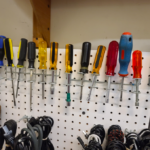 Our tour included a thorough view of their 16,600 square foot facility, which included areas for hardware tech support, an eBay pickup room, many storage areas, the intake hall with garage bays, sorting bins, hardware test, security data area (locked) closet, desktop refurbishing area, monitor testing, heavy duty vacuum cleaner, linux installation station, laptop storage, components, MacLand for Mac refurbishing, a space for storing their outgoing collection of like computers destined for organizations, a shipping prep area (they ship across Oregon, for SNAP), conference room, an HR office, break room, lockers for staff, bike lock-up, and a digital media room.
Our tour included a thorough view of their 16,600 square foot facility, which included areas for hardware tech support, an eBay pickup room, many storage areas, the intake hall with garage bays, sorting bins, hardware test, security data area (locked) closet, desktop refurbishing area, monitor testing, heavy duty vacuum cleaner, linux installation station, laptop storage, components, MacLand for Mac refurbishing, a space for storing their outgoing collection of like computers destined for organizations, a shipping prep area (they ship across Oregon, for SNAP), conference room, an HR office, break room, lockers for staff, bike lock-up, and a digital media room.
Demand for computers within the community remains very high, and it is sometimes a scramble to try to meet the needs. When they launched their Gift a Geek Box program, which was open to any adult meeting income requirements, they had over 700 applicants in two months. With that much demand, they had to shutter the program until they could serve all those folks. At present, they have met about half the need from that initial group, but it’s clear that there is still a huge demand. Their K-12 program has more funding, and they’ve been able to keep that going for new requests, but with publicity from the county library, have had a surge in requests for laptops there also.
The last several years have had their own set of challenges and opportunities for Free Geek. The early phases of COVID-19 helped shine light on digital inclusion issues and there were a lot of grants. Two years in, there isn’t as much focus and some donors are backing off (schools are giving away chromebooks; donors don’t see as much need). But chromebooks are loaned for the school-year, not during summer, so households lose access to their only computer.
Their former Executive Director left just before the start of COVID. Hilary Shohoney stepped in, and there have been some additional leadership changes. As they coped with the changing environment necessary during COVID, shifting from a retail store to Ebay, halting in-person classes and developing video training material, and reevaluating the criteria for giving away computers, the Free Geek culture has remained strong. They have reevaluated how their principles were applied within the organization. After learning that the meals they provided to employees were a main sustenance, due to housing costs, they raised wages.They currently have 45-50 employees, with a 38 hour week maximum (unionized).
Their current challenges include:
- allocating space,
- improving their internal processes to coordinate flow of equipment,
- considering technical support of additional platforms (Windows & Chromebook), and
- using multiple information management tools
While addressing these challenges, they continue to work to improve life for their employees, clients, and the broader digital inclusion community. One closing example of this is the diagram they developed to help their end users connect their computer once they got it home. Rather than multiple languages, they developed the following graphic guide, which they have agreed to share with all of us.
Special thank you to Adelle for sharing her day with us. Big shout out to everyone at Free Geek for all your exceptional work in digital inclusion.
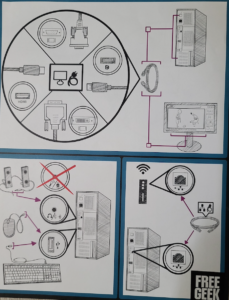
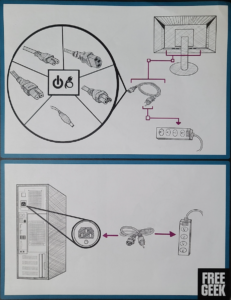
— Barry Glicklich – President, PBDD